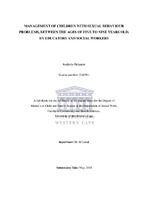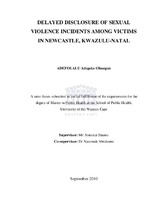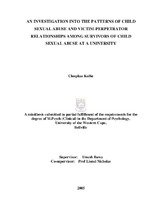| dc.contributor.advisor | Londt, Marcel | |
| dc.contributor.author | Philander, Rochelle | |
| dc.date.accessioned | 2018-09-17T12:20:49Z | |
| dc.date.available | 2018-12-31T22:10:06Z | |
| dc.date.issued | 2018 | |
| dc.identifier.uri | http://hdl.handle.net/11394/6404 | |
| dc.description | Magister Artium - MA (Child and Family Studies) | |
| dc.description.abstract | The Management of children, younger than twelve years of age, who pose a risk to other
children, remains complex and confusing. When their behaviour includes sexual aggression
towards other children, ignorance about how to manage them becomes even more
challenging. Society has an expectation that any sexual aggressor should be punished,
however, when the aggressor is younger than ten years old, different responses are necessary.
The aim of this current study was to explore the management of learners with sexual
behaviour problems, within the primary school setting. The main question underpinning this
study was: How are children, aged five-to-nine-years, with sexual behaviour problems,
managed by social workers and educators?
A qualitative methodology, with focus group discussions and semi-structured interviews were
used to conduct this study. Educators from primary schools, as well as social workers from
the Western Cape Education Department, were purposively selected to form the sample for
this study. Focus group discussions were conducted with the educators, while semi-structured
interviews were conducted with the social workers. | |
| dc.language.iso | en | |
| dc.publisher | University of the Western Cape | |
| dc.subject | Sexual problem behaviour
Childhood sexual development, Foundation Phase Educator, Learner-on learner sexual misconduct, Sexual violence, Child Protection System, Pre-school children | |
| dc.title | Management of children with sexual behaviour problems, between the ages of five to nine years old, by educators and social workers | |
| dc.rights.holder | University of the Western Cape | |




